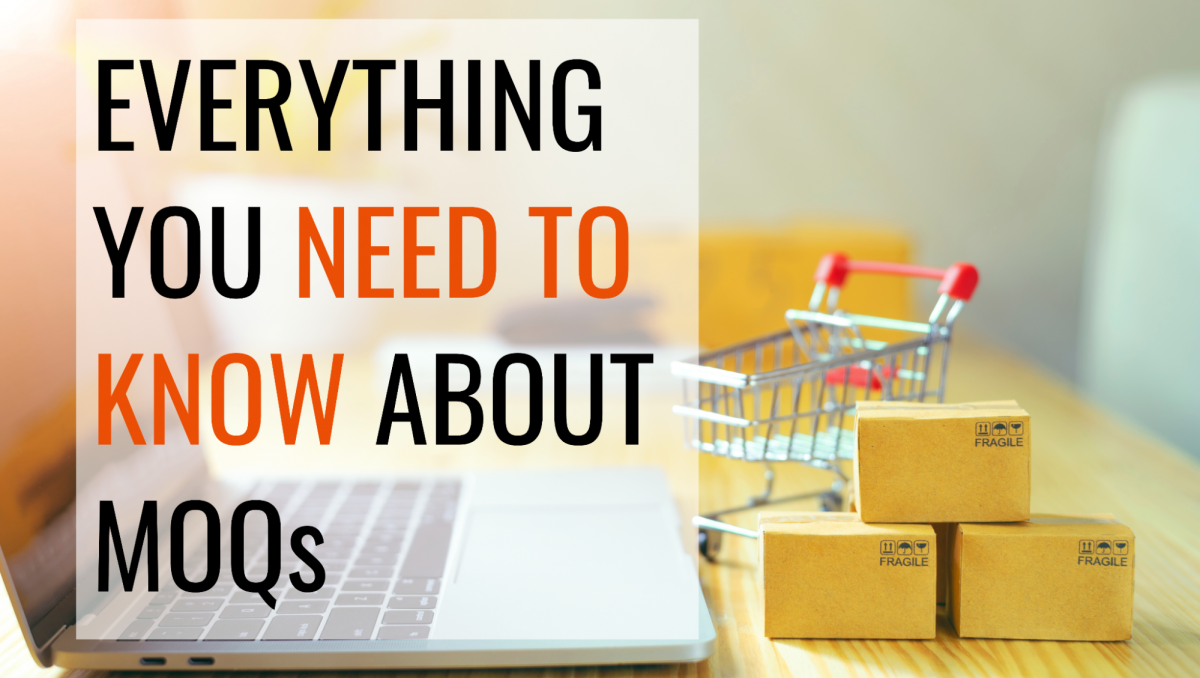If you’ve ever come across the term minimum order quantity when ordering products for your ecommerce store and wondered how it was applicable to your business, you’re not alone. According to Cogsy, until only recently, minimum order quantity requirements were something that only wholesale suppliers and manufacturers dealt with.
However, as ecommerce continues to boom, many smaller brands are now having to consider this component when ordering products, which, at times, can, unfortunately, cause quite the headache – especially for businesses just starting out.
But before we get into the nitty-gritty of minimum order quantities and how your business should approach them, let’s take a further look at what exactly this term means and why it is important in today’s growing ecommerce environment.
What Are Minimum Order Quantities and Why Are They Important?
According to the founder of A Better Lemonade Stand, Richard Lazazzera, the term “minimum order quantity”, or MOQ, refers to the smallest number of items or units that a supplier is willing to manufacture at a given moment. “MOQs are set by suppliers to cover their cost of production and ensure that they make a profit off of each production,” writes expert entrepreneur Lazazzera.
This component of product orders is something that varies from one wholesale business to the next, as every business will calculate MOQ differently, depending on the product they make and the cost of materials. For example, some wholesale suppliers will have large minimum order quantities, such as 100,000 units. Others will allow for low minimum order quantities, such as 100 units, or even one unit for bespoke or custom products.
You may be thinking, why does this matter to my ecommerce business? Essentially minimum order quantities are a vital component to any supplier or wholesale business, as it allows them to determine what brands they are willing to do business with.
Production always costs a certain amount, and by setting a minimum order quantity, suppliers can accurately establish how many units are required to cover their costs, as well as their profit margins, which will then determine their rates and who they can sell to. The rule of thumb is that the smaller the order, the higher the cost per unit.
In other words, this is the step when a brand finds a wholesale supplier that has attainable minimum order quantities which match their own requirements. For example, ecommerce businesses that operate on a smaller level will generally require small quantities of product. To suit this, they would need to find a wholesaler willing to supply products on a smaller scale and for a reasonable upfront cost, which not all are.
On the other end of the spectrum, when a business requires units in the hundreds of thousands, it will need to find a suitable supplier to meet such demands and ensure they are equipped with all the right raw materials, staff, and machinery to get the order correctly filled.
What are the Advantages and Disadvantages of Minimum Order Quantities?
According to Lazazzera, minimum order quantities are beneficial to businesses as they will give you the best possible available price per unit.
He says, “Oftentimes, the more in bulk you buy from a supplier, the more it drives down the cost of each unit. This means you’ll be paying less per unit that gets produced so you can maximize the profit you earn when you actually sell that product.”
Another benefit to buying in bulk is that it can lower your shipping costs, and if a good relationship is formed with your supplier, benefits such as discounts may be offered in the future.
However, minimum order quantities have their disadvantages too. For example, they often require an upfront cost to have the product produced, which can be a challenge to smaller businesses still in their early days. With this also comes the possibility that you won’t be able to sell all the products you’ve bought, resulting in a profit loss and having far too much inventory on hand.
Meeting Minimum Order Quantities
When you’re new to ecommerce, sourcing products can be incredibly difficult due to suppliers’ minimum order quantities. Especially if your business only requires smaller quantities of product initially and cannot meet the upfront order requirements.
In such a situation, the best option is to directly communicate this issue with a manufacturer, being open and honest about the number of units you need and can afford. And if they aren’t willing to budge, the next best step is to move on and find another supplier who is more suitable to your business needs.
(Source)
Lazazzera continues his article by saying that the best way to find these suppliers is to conduct plenty of research, going into the depths of Google and supplier directories.
Depending on what kinds of products you’re after, another option could be to find products that you can directly purchase unit-by-unit, where a minimum order quantity requirement isn’t essential. Online marketplaces and sites like AliExpress are a great idea for situations such as this.
While this may be more expensive in the long run, it is a great option should you have to buy products as and when you need them. Furthermore, it eliminates the issue of having to buy too much stock too soon and not knowing how to sell it all.
How to Negotiate Minimum Order Quantities
In some cases, minimum order quantity requirements can be lowered through negotiation. For example, during slow sales periods, suppliers will be more willing to budge on their order requirements due to lower demand.
But if you’re attempting to negotiate during a period of high demand, it’s almost guaranteed a supplier won’t want to negotiate as there will always be other brands willing to pay. Either way, successful negotiation requires a thoughtful approach. Here are some methods to help you get started.
Playing the ‘First Time Buyer’ Card
Suppliers are always looking to establish long-term relationships with retailers, just like ecommerce businesses aim to retain their customers. In this case, retailers may be willing to pass on the minimum order quantity if it means retaining your business in the future.
For example, you could negotiate to test the product first, writes Easyship, and ask for a lower minimum order quantity to do so. And if your trial run was successful, agree to then fulfill their order requirements and remain as a customer for a fixed period.
Ask for Product Bundles
If one manufacturer holds multiple products you want, why not ask if ordering in a bundle could lower the minimum order quantity requirements. This may work best if your order includes lower-demand products, which may persuade the supplier. It also will lower your overall shipping costs which can save you plenty of money when ordering in bulk.
(Source)
Negotiate the Timeline
Sometimes the biggest issue for smaller businesses is that they don’t have the storage place to take on the amount of stock that comes with a supplier’s minimum order quantity. If that’s your situation, check if the supplier would be willing to make the whole production order, however sending you initially only half and the remainder in a few months.
Not all suppliers are going to be open to this, and may charge holding costs, however some may be more willing to help if it means retaining you as a customer in the long run. If the supplier isn’t willing to hold the products and you don’t have the space, another option could be to out-source your warehouse.
Ask About Excess
Sometimes a supplier loses out when a merchant cancels an order at the last minute, resulting in excess stock. So why not try to help them out in such a situation and ask whether they have any overstocked products or canceled orders you can free their hands of?
Get our GN - Everything You Need to Know About MOQs delivered right to your inbox.
Five Important MOQ Tips
While minimum order quantities can be frustrating, especially when first starting a business, there are methods that can make them easier to deal with.
Here are the most important things to remember when dealing with minimum order quantities.
Do your research when looking for a supplier.
When selecting a wholesaler, the most important step is to have done your research in both your own industry and the various suppliers available to you. This usually involves plenty of desk research, and sometimes calling friends in your niche for contacts.
Don’t panic if it doesn’t work out with a supplier.
If things go south with a supplier, such as an unwillingness to lower their minimum order quantity requirements to suit your business needs, don’t freak out! There are lots of other suppliers out there who will be better suited to your demands and needs, it just requires a greater investment of time in finding them.
Focus on building a relationship.
Once you’ve found your supplier and are in the process of making your first order, it’s important to start building a strong relationship with them. By doing so, the supplier will be not only more willing to negotiate minimum order quantities in the future, and may even go as far as offering discounts and other benefits for your support and loyalty.
Don’t forget to negotiate.
Negotiation is possible when dealing with wholesalers. It’s just all about picking the right time to strike a deal with them, and considering what products they will be more willing to lower the price for.
There are ways to get around minimum order quantities.
If you simply cannot reach a supplier’s order requirements, maybe it’s time to consider another solution, such as buying your products through a trader, or online marketplaces such as Alibaba or AliExpress.
FAQs on Minimum Order Quantity
What is a MOQ?
Minimum order quantity (MOQ) is the fewest number of units a supplier is willing to sell to a merchant at any one time. As an example, one supplier might set a minimum quantity of 100 units. Depending on the product, a minimum order quantity could go as low as one unit for bespoke items, or on the opposite end into the hundreds of thousands.
Why are MOQs important?
Minimum order quantities are important when dealing with suppliers as it determines which brands they will be willing and able to do business with. Some wholesalers function to supply to smaller businesses, however, others work to supply products to incredibly large companies. It’s all about working out which wholesaler is the best fit for you.
What are the benefits and negatives of MOQs?
The main advantage of minimum order quantities is that a supplier will usually give you the best possible price per unit available, especially if a good relationship has been formed. However, minimum order quantities can be incredibly difficult to reach, especially for ecommerce businesses first starting out, mainly due to the upfront cost.
How do you negotiate MOQs?
There are many methods to negotiate minimum order quantity requirements with wholesalers. The most effective include presenting yourself as a first-time buyer, offering to buy excess products, asking to bundle products, or negotiating the timeline.
The Next Step: Finding Your Supplier
When doing initial product orders, it’s likely that you’ll come across minimum order quantity requirements. To avoid any panic when the situation arises, the best thing you can do is select the right wholesaler suited to your online store’s needs.
Here’s how to do so:
Step One: Conduct research in your own industry and the various wholesalers supplying it. This usually requires time searching through Google or asking around for recommendations.
Step Two: Once you’ve got a few possible suppliers in mind, it’s important to establish your own requirements and needs. For example, how many units do you need? How much are you able to pay up-front? If these units go unsold, would there be a great profit loss?
Step Three: The final step is to reach out to that supplier and begin the sales process. If the minimum order quantity requirements are slightly too high, don’t forget to try negotiating with the supplier to see if there is any possible wiggle room. If not, move on to your next best option.
Bonus Tip: If it’s simply not working out for you due to order requirements, remember that you can find your products elsewhere on online marketplaces or by contacting traders. Once your business is up and running after your first stock order, then you can try again with suppliers and begin forming a relationship to sustain your inventory in the long run.
Need a marketing strategy that will help grow your ecommerce business? Reach out today for your FREE 20-minute consultation call, and let’s find some solutions that will scale your business fast.
Get our GN - Everything You Need to Know About MOQs delivered right to your inbox.







